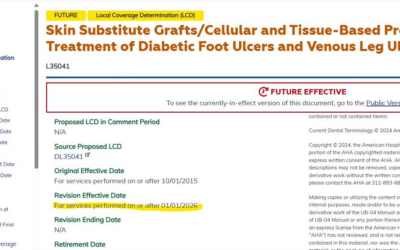A new post by attorney Knicole Emanual is vitally important for anyone under a Medicare audit. This particular audit refers to one conducted by the Office of the Inspector General (OIG) and not just your run of the mill Medicare audit. The reason that matters is that with an OIG audit, the auditor can “extrapolate” its findings to years of claims and demand millions in re-payments. The focus here is about what constitutes a “statistical sample.”
Audits over cellular and/or tissue-based products (aka “skin substitutes”) and hyperbaric oxygen therapy (HBOT) continue to be the norm – not the exception. Here’s a hypothetical example of what auditors CAN do that is not a fair “statistical sample.” An auditor can decide to look at multiple treatments in the same patient (rather than multiple patients). So, if by way of example, the Hemoglobin A1C value or vascular assessment information is missing on a patient with a diabetic foot ulcer who got HBOT or a CTP, and they audit 20 treatments on that one patient – you would fail their “statistical sample” because the same missing lab or study data would affect all that patient’s treatments. Depending on what type of audit it is, you could end up losing a lot more money than just the payments on that one patient. It all hangs on the definition of a “statistical sample.”
Read Ms. Emanual’s recent blog post. This case had nothing to do with HBOT or wound care, but that’s not the point. A hospital challenged both the OIG contractor’s sampling methodology and its determinations by requesting a hearing before an Administrative Law judge (ALJ). The ALJ found that OIG’s statistical extrapolation process did not comply with § 1893 of the Social Security Act, nor with the MPIM’s guidance on statistical extrapolation. The contractor did not appear to provide an explanation of its sampling and the ALJ determined that the extrapolation was in error. A legal battle ensued that made its way to the federal district court, where the ALJ decision was upheld.
Auditors are playing it fast and loose with what constitutes a “statistical sample” in some of these reviews, and it’s possible to win a case in court if the auditor can’t substantiate what they did. It’s a messy legal business and takes a long time.
–Caroline
District Court Upholds ALJ’s Decision that Extrapolation Was Conducted in Error





